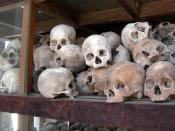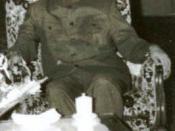Millions of innocent people have lost their lives. It has happened all over
the world to many different kinds of people; from Bangladeshis to Jews and from
Armenians to the Hutu. Many circumstances affect the final out come of the great loss of
people, from revolution to colonization to an ethnically diverse society. People are
persuaded to do such brutal actions. Several actions have been taken to prevent genocide
and the rise of another Hitler. The word is new the crime is ancient.
Polish scholar Raphael Lemik, in 1933 created the term genocide from the Greek
word genos, meaning race, and Latin term for killing cide. Lemik's proposed word and
definition are recognized in the 1948 convention. The 1948 convention defines genocide
as, any of the following acts committed with intent to destroy, in whole or in part, a
certain group of people, such as: killing members, causing mental or bodily harm,
imposing measures to prevent birth, or taking children to another group forcibly.
In
addition to genocide itself, the convention says that planning, attempting, and inciting
genocide are also punishable acts. Some acts were left out of the convention such as
deliberate destruction of political groups and forcible assimilation into the culture of
choice. Persons that commit genocide or any of the acts are to be punished no matter their
social status. Persons that commit the genocidal acts are to be tried by an acknowledged
tribunal in the area in which the crime occurred. Genocide according to Lemick, does not
always occur by mass killings; the destruction of essential foundations of the group is like
exterminating them, they will no longer have an identity and therefore not be referred to
as previously named. (Howard Ball, page 96-98)
Many ethnic groups have suffered genocide around the world. The Armenian
genocide was done by the Turks. It broke out several times for different reasons. The first
genocide done by Sultan Abdul Hamid (1876-1909) was to preserve a state structure,
which kept the Christian Armenians in the Ottoman Empire submissive and unable to
resist tyrannical rule. The second major genocide was done by the Young Turks party
(1908-1914), it was to bring about fundamental and major changes in the status and
create a new frame which did not include the Armenians. Hitler's Final Solution was
concentrated on the Jews by Nazi Germany. Hitler said "Aryan" Germans were a superior
race whose nation was ruined by racially unwanted groups such as the Jews. The nazi
"solution" was mass murder of Jews around the world; it took place (1939-1945) in many
countries in Europe and anywhere else the Nazis gained control of. In the racial
purification they persecuted and killed handicapped people. Gypsies, Soviet prisoners of
war, Polish intellectuals, homosexual men, Jehovah's Witnesses, and Germans of African
Heritage. From 1975-1979 between one and two million people perished in Cambodia,
ruled by the Khmer Rouge, communists led by Pol Pot. Phnom Penh fell to the Khmer
Rouge in 1975, Brother Number One, or Pol Pot first executed the leaders of the old
regime, emptied cities, forced people into communes, and started social engineering; the
regime killed enemies and slowly saw enemies everywhere. The genocide stopped after
Vietnamese invasion less than four years later. Genocide also took place in the small
country Bosnia-Herzegovina during the 1990s. After Bosnia's declaration of
independence from Yugoslavia, a three-year war took place between the country's
Serbian, Croatian, and Muslim ethnic groups. In response to the independence of Bosnia
Milosevic attacked the Capital city Sarajevo. The capital along with the country mostly
Muslims was hopelessly outgunned, they began to round up Muslims in scenes similar to
those of Nazi Germany in World War Two. The Serbs called the secret camps, mass
killings, and destruction of mosques and historic architecture in Bosnia ethnic cleansing.
After three years the United States and the United Nations stopped the conflict. The
African country Rwanda is made up of the Hutu majority and Tutsi minority. Genocide
took place in Rwanda in 1994 and lasted for one hundred days; the Tutsi were targeted
for the extermination. The killers did not want to merely expel the Tutsis out of the
country, they had been allowed to leave in 1959 and did not leave, the same mistake was
not going to happen again. Many Hutu against the genocide were slaughtered as well.
United Nations helped to end the conflict about one year later.
Ordinary men in genocides, kill innocent people that lived alongside them for
many reasons. There are two major factors, indoctrination and propaganda. In all
genocidal societies, there are training programs that make the people hate the targeted
group. Ordinary people go along with the propaganda since it is the norm everyone goes
by in the state they are in. The second factor is dehumanization, the press, posters, radios,
films, and plays all make the targeted group seem like demons in the mind of the average
citizen. When an enemy like this is denied humanity and is constantly called vermin for
instance, the ordinary men eventually see them as worthless. Khmer Rouge soldiers said,
"to allow you to live is no benefit, to destroy you is no loss". Most of the soldiers in
genocidal societies have no problem murdering and taking away innocent people.
(Howard Ball, page 98-100)
Diversity of people and beliefs in a society provide the necessary conditions for
genocide; this has occurred in most of all the genocides including: India on partition,
Bangladesh, and Rwanda and Burundi. Most of the societies in the world today are plural
or diverse societies, they are only more prone to genocide if there has or are persistent
cleavages between racial, ethnic, or religious groups. There is generally inequality in
politics as in South Africa or practical inequality, as in Northern Ireland, where
Protestants succeed in political, domination (Kuper 58). Political inequality is connected
with economic discrimination; this goes with employment, wages for jobs, and access to
production for businesses. Inequality also goes into education, and human rights. These
structural conditions make genocide more probable. Similar people start to aggregate and
this makes it easier for conflict to move, a local disturbance may start a chain of events
like demonstrations, police reprisals, terrorism, and political confrontations. With a long
history of struggle, the dominant group will remember past injustice and atrocity, this
will get emotions up and would go on to destructive violence. Many plural societies do
not go into subjective reactions and a chance to keep a destructive conflict. Colonization
is a major creator of plural societies; colonization and decolonization are both associated
with genocidal massacres. The colonization and revolution of Algeria are among the
bloodiest conflicts in the history of colonization. (Leo Kuper, page 57-83)
Genocides cannot take place without the efforts of many people. There are three
conditions-psychological, cultural, and political-by which the genocide is made possible.
In the cultural condition the perpetrators may have been taught that they are more
superior to the victims, which may work as a justification for the crimes. Mechanisms are
carried for the perpetrators not to feel guilt, pain, or empathy. The basic psychological
condition is having strict obedience to the authority, following orders is higher than your
own consideration. The men do not see themselves as responsible for the crimes, they
only consider themselves as instruments used by the officials in power. A war criminal
after the holocaust was ended, Adolf Eichmann said, "I had nothing to do with killing the
Jews. I never killed a Jew, but I never killed a non-Jew either; I've never killed anybody.
And I never ordered anybody to kill a Jew". Eichmann stated if he had received an order
to kill a Jew he would have done it. Eichmann recalled feeling remorse if he had not
followed his orders to set up a transportation system to move millions to their death.
Morality for many men in most genocides is how well they carry out tasks, they have no
feelings of remorse. Men such as Eichmann, do not look at women and children as
humans going towards their death, but as orders to be followed and simply a clump. "I
rarely saw them as individuals. It was always a huge mass."-Franz Stangl, commandant
of Sobibor and Treblinka extermination camps. Human destructiveness is not only done
by psychopaths. Evil is mostly done by ordinary people, an example is the decision-
making bureaucracy in the contemporary U.S. Many talked about mass death as they if
they were discussing what to buy for lunch. U.S. citizens did not question the official
orders, they went along with what the authority said with full nationalistic ideas.
"Whatever the President does is to be supported simply because he is the president" said
William Dudly. People view politics and relate to authority by what they were taught
growing up. "As children, we are all exposed to the cultural and political myths and
legends common to our environment." We learn these myths by political socialization;
these myths become legitimate norms, as they are the accepted view by the majority and
many leaders. In genocide if leaders spread "dehumanizing symbolizations of another
state or group of people, they send a message that it is justified to act aggressively against
the state or group"; aggressive behavior occurs when symbolizations become a norm. The
Jews were continually described as vermin and bacilli, an example of dehumanizing
symbolization. Political and religious leaders did not go against the ideas, which quickly
became legitimate norms; people obey leaders who communicate the normal ideas. In
some cases, for example Germany, the extermination of the Jews became a legitimate
norm after so many accepted leaders agreed and supported it. (Herbert Hirsch, page 73-
78)
The Early Warning System can prevent genocide; it is for setting up information
and announcing warnings of the emergence of a genocide in the world. The Genocide
Early Warning System has had positive reviews from many official people. Willie
Brandt, former chancellor of West Germany, wrote, "Your plan to develop concepts and
proposals for disseminating the information on the genocide and human rights data bank
sounds fascinating. I would like to assure you that I am ready to give my moral support."
The system collects information on three levels. First, to gather information on current
genocides and massacres. Second, to monitor the violations of human rights around the
world. Third, to conduct researches studying patters through which the crimes build up;
necessary to learn how to predict and tell people the coming of a mass murder ahead of
time. The system is not only about information, it speaks for the intention to care and
protect humans in every vulnerable area in the world. The main purpose of the Warning
System is to develop new ways to attack the mass murders before they move into effect.
(Israel W. Charny, page 113-118)
Genocides are the work of few people; they are made possible by the passivity of
whole populations. People need to remember history, for no small group to organize mass
murder again; like all previous genocides. We should not only remember what happened
but why and how it happened. Events in Indochina show what happens if we remember
the Holocaust and what happens when we do not. During the case of the Vietnamese boat
people, we recalled the Holocaust. After the Vietnamese war, the communist government
forcefully expelled the ethnic Chinese from Vietnam; this was compared to the Nazi
genocide. Many people remembered "the great failure of the world's nations to admit
refugees trying to flee the oncoming Holocaust and then the Holocaust itself" from 1938
to 1945. Due to the remembrance of history and in this case the Holocaust, in a United
Nations conference held in Geneva many countries pledged to take Indochinese refugees.
The Cambodian story is not heartening like the Vietnamese story is; the genocide erupts
killing one-forth of the country's population. Forgetting history and therefore genocide, is
a message saying we accept mass murder. (David Matas, page 119-123)
The need for a permanent International Criminal Court is required for all the
world's serious crimes. The world is witnessing a permanent International Criminal Court
become established. Two basic concerns have to be solved for it to be effective. First, an
ICC must be supported financially and militarily to ensure success, the United States one
of the world's major powers, opposes the idea of an ICC. The second concern, is what
can the criminal tribunal do to lessen the crimes that the world has seen inflicted on
millions of people, and will the actions taken deter future such actions of genocide?
(Howard Ball, page 96-97)
Genocide, the cruelty shown by one group against another group. The worst
crime to occur throughout human history. Fifteen million innocent lives were lost alone
after the holocaust, only fifty years. The crime has been inevitable since ancient times,
and until this day most genocides are not avoided.


